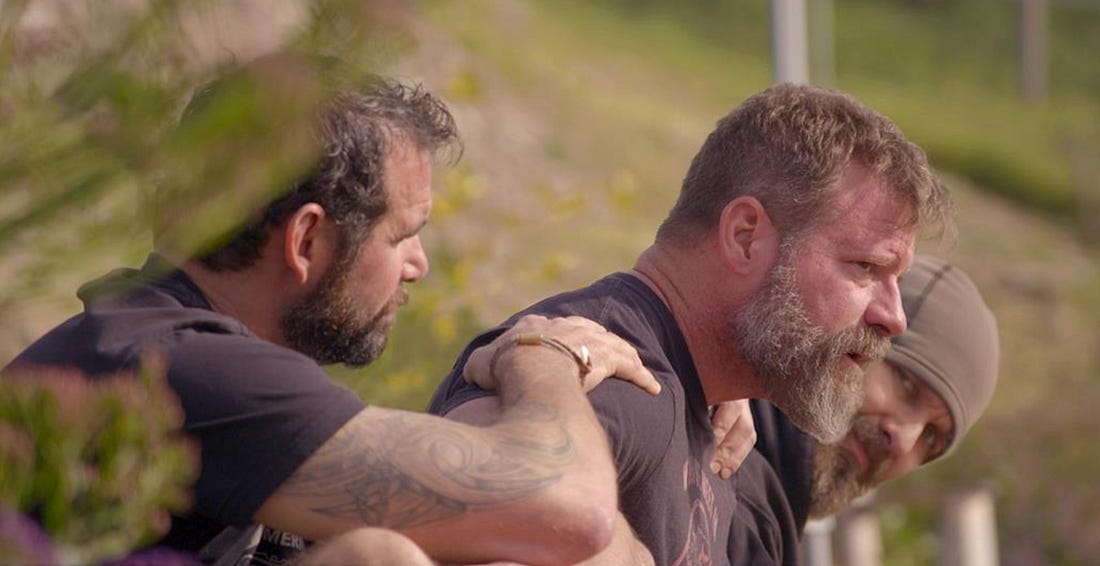If We Didn't Abuse Our Children, Would We Even Have a Military?
What Navy SEALs on ibogaine revealed about the trauma pipeline we refuse to see
Housekeeping: This extraordinary piece will be sent out in two parts. The second half of this incredible post by Linnea Butler will be published tomorrow, November 22, 2025.
April Note: This compelling piece by Linnea Butler cut right to my heart. Last June, on Fathers’ Day, I dedicated a piece To My Father. My father was an Army Ranger, similar to the Navy’s SEALs. After reading this piece by Linnea Butler, I too wondered, “If we didn’t abuse our children, would we even have a military?”
Part I:
I paused the documentary.
My hand found the remote as my heart skipped a beat, knowing it had just heard the deepest truth. I’ve watched dozens of films about psychedelic healing - it’s part of my work as a psychedelic psychotherapist. I know the arc: trauma, medicine, breakthrough, integration. I’ve sat with clients through their own versions of this journey. I thought I knew what I would see.
Then a Navy SEAL — hardened, trained, the kind of warrior we build myths around — said it:
“You have to wonder... if we didn’t abuse our children, would we even have a military?”
The question hung in my living room, in the deep silence that was the only possible response.
Not because it was shocking. But because it was true.
I’m not a veteran. I’ve never served in the military. But I am a survivor of childhood trauma. And I know in my bones, in my nervous system, in the desperate seeking that shaped my early adult life, exactly what that SEAL discovered under ibogaine.
The war didn’t start overseas. It started at home.
What the Medicine Revealed
In Waves and War (Netflix) follows Navy SEAL veterans through their healing journey with ibogaine and 5-MeO-DMT, two powerful psychedelic medicines that indigenous cultures have used for centuries to heal what we might call soul wounds. I’d watched it expecting to witness the healing of combat trauma. PTSD. Moral injury. The visible scars of war.
That’s not all that these warriors found.
Under the influence of medicines that won’t let you lie to yourself, that bypass every heroic narrative and defense mechanism, these SEALs discovered something that shattered their understanding of their own stories:
The trauma they carried from combat was real. But underneath it was childhood.
The first time they learned the world was dangerous. The first time they learned they were alone and there was no one to trust. The first time they learned that love and violence could wear the same face.
And here’s the part that stops your breath if you let it:
The military didn’t break them. It was the first place their broken pieces found a place that made sense.
The Terrible Logic of Brotherhood
If you’ve never experienced it, this won’t make sense. It’s counterintuitive. It’s a paradox that only resolves in the body.
Why would someone seeking safety join the most dangerous organization on earth?
Because brotherhood isn’t just a bond. It’s a nervous system experience and the first place that total trust was not only possible, but a requirement.
When your childhood home was filled with unpredictable violence, emotional abandonment, and the kind of chaos that teaches you the world is fundamentally unsafe, your nervous system never learns what secure attachment feels like. You don’t know what it means to have someone reliably present. Someone who won’t abandon you. Someone who has your back. Someone trust-worthy.
Until you join a team. An elite force. A brotherhood that will die before they leave you behind.
For the first time, your nervous system learns: I am not alone.
The danger is real. The threat is constant. But it’s honest. At least in war, you know who the enemy is, and the hypervigilance that’s been running your system since you were a child finally has purpose. It feels like strength instead of dysfunction.
The military doesn’t create secure attachment, let’s be clear about that. But for some nervous systems, it’s the first place that predictable danger becomes a template for something that feels like safety.
Trauma is an intense experience and when that is all you know, then it the only thing that makes sense. You don’t seek safety in safe, calm places.
You seek it in intensity where the danger is predictable. Where the bond is real enough to trust.
The Pipeline We Don’t Name
I need to say something that will make people uncomfortable.
We are running a trauma pipeline. And we depend on it.
Here’s how it works:
Childhood abuse → desperate seeking for belonging → high-risk organizations that provide bonding through shared intensity → more trauma → veterans returning home carrying wounds → children growing up with traumatized parents → childhood abuse.
The cycle isn’t only present in war veterans. We see it in any high intensity career such as EMTs, ER doctors and nurses, teachers (yes, teaching is intense - running active shooter drills counts), firefighters, stock traders, line cooks, and hazmat workers to name a few.
And then we call them heroes for surviving what we refused to prevent.






My childhood abuse wired me for anxious attachment and a nervous system stuck in fight-or-flight. I chose battlefields too, just without a gun. Growing up in Europe in the ’60s, with WWII still in the walls, that was never an option. Same addiction to intensity, same borrowed sense of meaning.
When the root finally comes into view, the work becomes simpler:
unwind it from the nervous system, one breath, one step at a time.
Thank you for putting this in writing 🙏🏻 very insightful